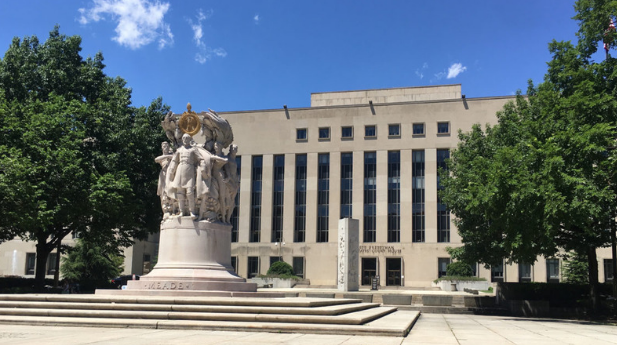

The executive orders, issued in May 2018, placed limitations on federal unions’ bargaining ability, official time, travel, and access to office space. The EOs also make fewer options available for employees who wish to appeal an agency’s decision regarding certain employment matters. NFFE-IAM and seventeen (17) other federal unions responded by filing a lawsuit against the Trump administration in D.C. District Court where Judge Ketanji Brown-Jackson ruled overwhelmingly in favor of the unions and issued an injunction preventing federal agencies from implementing the EOs. The Administration then appealed the decision to the D.C. Circuit Court of Appeals.
While NFFE-IAM and others vigorously fought to uphold the District Court’s decision, the panel ruled against the unions on jurisdictional grounds, allowing the EOs to go into effect until each issue can be litigated piecemeal through the Federal Labor Relations Authority (FLRA).
Suzanne Summerlin, NFFE Associate General Counsel, provided the following statement to Government Executive Magazine immediately following the decision, calling the decision “intellectually bankrupt.”
“We feel that the D.C. Circuit took the jurisdictional challenge as sort of an easy out, because they would have rather not dealt with the substantive challenges to the sitting president of the United States,” Summerlin said. “There is no way that the Federal Labor Relations Authority, which is made up of presidential appointees, can handle these questions. That’s not what they’re designed to do, and that’s not what the Constitution allows them to do…It would be the executive branch policing the executive branch.”
NFFE-IAM and its allies are continuing to explore avenues to prevent the orders from taking effect, including asking the full panel of the D.C. Circuit to review the case again (called ‘review en banc’). NFFE-IAM is committed to stopping these illegal executive orders and other threats to fair treatment and conditions of employment that labor unions and collective bargaining agreements protect.
- Directs agencies to renegotiate collective bargaining agreements as soon as possible;
- Sets arbitrary timelines for the negotiation process which, when exceeded, will result in the unilateral imposition of terms by the agencies;
- Establishes a new bureaucracy called “The Labor Relations Group” that will dictate “one-size-fits-all” proposals to agencies engaged in bargaining; and
- Encourages agencies to engage in “take-it-or-leave-it” bargaining tactics inconsistent with agencies’ good-faith bargaining obligations.
- Attempts to prevent union stewards from using official time to aid employees in preparing or pursuing grievances;
- Directs agencies to drastically reduce official time authorizations to 1 hour per bargaining unit employee per year, an attack designed to make it harder for your union to help you; and
- Cuts off access to agency office space for union officials carrying out their representational duties making it harder to help workers.
- Encourages agencies to abandon fairness concepts such as progressive discipline process;
- Encourages agencies to tailor different penalties for the same or similar offenses, ignoring established law;
- Directs the Office of Personnel Management to give performance appraisal more weight than seniority when an agency faces a reduction in force, creating great potential for unfairness; and
- Instructs agencies to take away our ability to grieve unfair removals from service or to challenge performance appraisals or awards at all.
